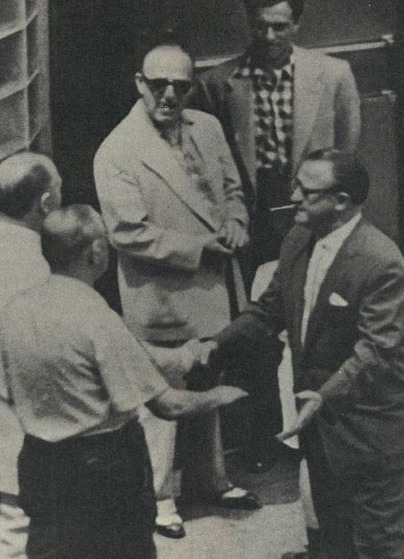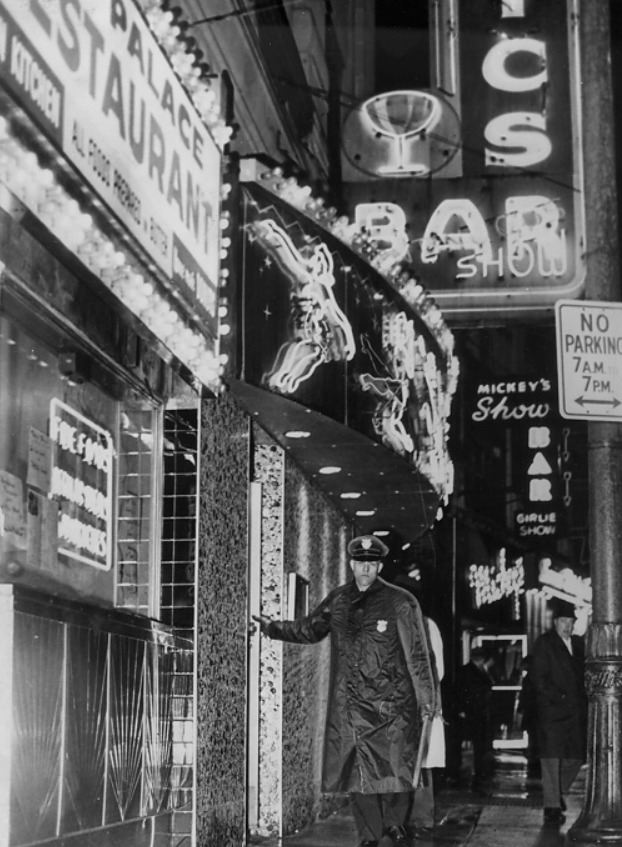
Gangsters plotted there. Milton Berle and Jimmy Durante hammed it up there. Perry Como and Dean Martin launched their careers there. Richard Rogers and Oscar Hammerstein hosted a private party there. When the Cleveland Indians ended Joe DiMaggio’s 56-game hitting streak, Joltin’ Joe drowned his sorrows there. Art Modell sealed the deal to buy the Cleveland Browns there.
The famous (and infamous) Theatrical Grill was a mainstay on the equally famous (and infamous) “Short Vincent” Avenue off East 9th Street in downtown Cleveland. In fact, the histories of the restaurant and the street are largely comingled, particularly in the middle decades of the 20th Century. When former truck driver Morris “Mushy” Wexler and his brother-in-law Micky Miller purchased the 70-year-old former brewery in 1938, Vincent Avenue already was wall-to-wall cacophony. In addition to Micky’s Bar and Grill (the Theatrical’s original name) food could be had at Frolics, Kornman’s, Leo’s, Stouffer’s and the Tastee Barbeque. Wants of a baser nature were satisfied at the Roxy Theater/Burlesque and Jean’s Funny House, which also was known as Jean's Fun House, Jean's Novelty Shop and Jean's Novelty and Magic Shop. Cobblers, barber shops and dry cleaners kept Vincent Avenue denizens looking natty. Up and down the one-block street, gamblers, sports figures and racketeers mingled with celebrities, lawyers, newspapermen and tourists. The south side was seedier; the north side had a somewhat more reputable image. The road in between was affectionally known as the “Gaza Strip.” But north side or south side, Short Vincent was an A-list destination for many of the 900,000 people who lived in Cleveland before the war, as well as those from nearby suburbs like Cleveland Heights and Lakewood. And the Theatrical was Short Vincent’s crown jewel.
A sense of living and playing on the margins enhanced that allure. Even reputable businesses on Short Vincent were regularly patronized by underworld figures, mob bosses and gamblers. Alex "Shondor" Birns – for a while, the Theatrical’s silent partner since convicted felons could not hold a liquor license – held court at his personal table. Birns’ nemesis, Danny Greene, often shared the premises, although the restaurant, frequently referred to as “Switzerland,” was strictly neutral territory. Jack Licovoli, boss of the Cleveland Mob hung out there but never drank. Even Mushy Wexler ran Empire News Service which, using Western Union telegraph technology, apprised bookies of changes in the line for horse racing and football. Wexler was frequently at odds with the taxman, the Liquor Control Board, and even the Kefauver organized crime Committee. Banned for a time from racing horses, Wexler also owned one of the world’s largest horse stables in the country in Lexington, Kentucky. One of the horses that Wexler raised finished second in the Kentucky Derby and, the same year, won the Preakness.
Yet celebrities outnumbered gangsters. Frank Sinatra sang there for free. Marilyn Monroe paraded through with husband Arthur Miller. Georgie Jessel, Tony Bennett, Lauren Bacall, Edward G. Robinson and Judy Garland basked in their own glory. Joe Lewis, Pancho Gonzalez, Woody Hayes, and the entire New York Yankees baseball team swung by. Cab Calloway, Gene Krupa, Oscar Peterson and Dizzy Gillespie jazzed the place up.
A grease fire on September 14, 1960, completely destroyed the Theatrical. But Wexler rented a corner bar in the nearby Hollenden Hotel while his restaurant was being rebuilt, and he thus held on to most of his customers. A glamorous new Theatrical opened in October 1961 with a 750-customer capacity, a second-floor “Commerce Club,” oodles of Italian statuary, and an integrated undular bar and stage. “The end of expenditures on this pleasure palace is not yet in sight,” crowed Mushy Wexler in a July 1961 interview.
But while the end may not have been in sight, it nonetheless was coming. The Theatrical continued its reign well into the 1960s, but Cleveland’s decline had set in motion a slow downtrend for Short Vincent and the Theatrical. This was the era of Wexler son-in-law Irving "Buddy" Spitz, who assumed day-to-day control of the still-flourishing restaurant after Wexler suffered a heart attack in 1965. Shondor Birns objected to the transfer of power and his not-so-private partnership with Wexler was dissolved. Wexler eventually retired to his 27-acre farm in Solon, which supplied vegetables to the restaurant.
Throughout the 1960s businesses left the street and demolitions chipped away at the aging structures. By the end of the decade most of the north side of the street had been cleared to make way for the Central National Bank Building. Ten years later, south side establishments had been cleared to make way for National City Center. By 1978 the Theatrical was the only non-parking business left on Short Vincent. Wexler died in 1979.
In 1990, Buddy Spitz sold out to restaurateur Jim Swingos, the owner/proprietor of another legendary Cleveland eatery, the Keg & Quarter on East 18th Street and Euclid Avenue. Swingos later sold the restaurant to business people who unsuccessfully sought to make the place a comedy club, followed by a sports bar and (the final indignity) a “gentleman’s club” complete with pole dancing. The Theatrical closed for good in 1999 and – perhaps reflecting the longstanding practice of blowing up mobsters in parking lots – the building was demolished for a parking garage. For decades, in fact, that may have been Cleveland’s most galling custom: creating places to park by demolishing places to go.
Images





